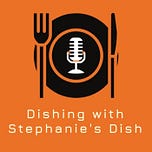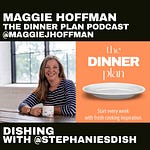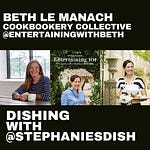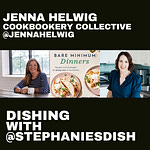Stephanie [00:00:15]:
Hello, everybody, and welcome to Dishing with Stephanie's Dish, the podcast where we talk to people that are cookbook writers obsessed with food or otherwise food at Sent. And I'm very excited to talk to someone today. Her name is Tamar Adler and she has written this book called The Everlasting Meal Cookbook leftovers a to Z. And I first read about it, I think, in maybe the New York Times. And then I got a copy of the book, and you guys, people that know me know I'm obsessed with my freezer. I'm obsessed with Mason jars. I'm constantly repurposing things. I'm like an old housewife from the 1920s. I can't throw a thing away. And this book is like the guide to how to make sense of all this chaos, of all these leftovers and these little dribs and drabs that you have. I just am so impressed with you. Thank you for coming on the show.
Tamar [00:01:13]:
Oh, my gosh, I'm so happy that I'm talking to a soul sister and saving.
Stephanie [00:01:18]:
So how did you have you been like this since you were a little kid and finally just wrote this? I mean, it's a tome.
Tamar [00:01:26]:
And I wanted it to be longer. My publisher cut me off at some point. I haven't been like this. I mean, I've always liked saving things, and I've always been sort of into things that had age to them or stories. But I think that this actually came from being a professional cook, because I think, contrary to what a lot of people think would be true, professional cooks are amazing at using all of everything and both what is done. In restaurants and certainly what's done for diners but also what's done to serve the staff of a restaurant is always a version of either thinking ahead, so cooking something partway and then finishing the cooking or making sure that you're cooking something in a way that lets you use it over the course of days or making sure to eke all of the flavor out of anything that you have. So it was being a professional cook that kind of helped me realize that I could if I could put down on paper what so many of us already knew but from years of professional cooking, then I could kind of hand some of it off to home cooks.
Stephanie [00:02:50]:
Yeah. During the pandemic, many people sort of rediscovered cooking and certainly their pantry and maybe things that their mom did or dad that they hadn't thought about, that now all of a sudden you're at home and you can't run to the grocery store every day unless you're going to have the survival gauntlet. Because it was kind of a grim time. So we went back to some of this. Like an example in here, you talk about moldy cheese. Well, my mom just cut the mold off the cheese, and we just kept going. She never missed a beat with it. But you take it further in zest and different. Any ingredient that you have, you can literally look up in this book, you guys, and she tells you what to do with it.
Tamar [00:03:42]:
I mean, my theory was, if you have it, why not use it? And I think remembering the pandemic is a really sort of smart point of orientation for how to use this book and also how I wrote it, because that was a time during which all of our outlooks was, if I have something, I'm going to use it, because the stakes of going out to get a new thing are just too high. And so the stakes feel different now, and they are different, but they're still stakes, right? It still takes a lot out of every person to go to the supermarket. I find it takes a lot of energy, and it takes, like, personal energy and planning and gas for the car and the standing and the line, like, the whole thing. Plus, it costs money. So it's like, if you have it, why not use it? And that is what I was trying to help people do in this book.
Stephanie [00:04:41]:
And I'll just like an example that I talked about on this podcast a while ago that I overcooked quinoa for a TV segment I was doing, and I had all of this quinoa, and I froze it in these little cubes right in the freezer. And I've been making bowls, and I've still got all these cubes left, and I looked it up in your book, and I can make a savory tart with the quinoa crust. I would have never thought of that.
Tamar [00:05:05]:
Oh, yeah, that's great.
Stephanie [00:05:07]:
Yeah. And then obviously a quinoa salad, but you talk about making it crunchy by adding all of these other elements to it, and it just like I looked up quinoa, and I was like, who would have thought to make a crust with that? That's how useful your book is. And it is called the Everlasting Meal Cookbook. I just want to make sure I repeat it. When you thought about organizing the book so that somebody like me who's got a cup of white beans left, and what do I do with that? Or right now, I'm awash in ham from Easter and trying to get creative ways to eat ham other than a ham sandwich and pea soup, because I've already done those. How did you think about how to organize things?
Tamar [00:05:50]:
Okay, before I answer the organization question, I just want to shout out to Emma McDowell, who is the person from whom I got the quinoa crust recipe, just because I just don't want to take credit. I thought so brilliant, and I definitely got the idea from her. And she, I think, has a book out, and she has recipes on the Internet all the time, and she's super great. But I at first wanted to organize the whole book alphabetically. I thought that would be easiest. So just A to Z and you would look up quinoa under Q and beans under B probably, although then it's like or do you look them up under cannellini and ham under H? But I did that for the first draft. Maybe two drafts of the book were just purely alphabetical with no other organizing principles. And I had a friend who always reads my draft who said that it made for some really inflicitous neighbors. He didn't like reading the word anchovy next to apple peel. He felt like it just made him want to close the book up and just not worry about either the anchovies or the peels. Yeah, nothing. He was like, at first I sort of booked, and I was like, but the whole point is that it's like a reference book. And then I calmed down a little bit, and I thought, that's true. And that maybe a new it's also not. You do kind of want there to be a category that you're searching in, because that is often how we use reference books, too. And so I decided to create larger leftovers categories, which it still can be, I think, confusing to somebody because we're so used to searching any culinary text by what we want to make, not by what we have. And I have had to remind people, if you look up a roast beef sandwich, I am not giving you a recipe for a roast beef sandwich. I'm telling you what to do with the soggy half of roast beef sandwich you have left.
Stephanie [00:08:06]:
Yes.
Tamar [00:08:09]:
But creating those larger categories is how I ended up organizing it. So the first chapter is vegetables, and it's leftover vegetables. The second is fruits and nuts, and it's overripe underripe, et cetera. And leftovers of all, there's leftover bread, leftover rice and grain. I mean, rice and beans. Leftover stuffed dough's was kind of a hard category to come up with, but it kind of made sense to me. There's leftover drinks, leftover sweets. Oh, leftover snacks. So stuff like the dust at the bottom of a pretzel bag or cheetos.
Stephanie [00:08:48]:
Which that dust is amazing. If you're like going to bread something or put a little sprinkle on a little pile of soup that you're eating.
Tamar [00:08:59]:
It'S like extra good salt.
Stephanie [00:09:00]:
Yes, extra good spicy salt. And even like, I make Caesar salads all the time, and I like to use real anchovies in the dressing. How did I not think about using the anchovy oil? And I've just been throwing that away.
Tamar [00:09:16]:
I'm glad that you now have ideas for it.
Stephanie [00:09:19]:
Yeah, it's such an obvious one, like, oh, yeah, this is that delicious flavored oil. Why aren't you doing something with it? And also something I discovered during the pandemic is brine from pickle juice.
Tamar [00:09:33]:
Oh, yeah.
Stephanie [00:09:34]:
I was just not salvaging my brine, and now I'm hoarding it.
Tamar [00:09:39]:
Yeah, because if you're going to do a whole chicken or a bunch of pork chops, you actually need kind of a good amount right. You need to be saving the pickle juice from two jars because you need a lot.
Stephanie [00:09:54]:
And frying chicken and brightening the chicken before you fry it in. That pickle juice is a secret of many chefs. Was there something that you did not know what to do with it like pistachio shells. Let's use that as an example.
Tamar [00:10:16]:
Well, we have always used those for fire starters. Those are pretty good for starting, like a wood stove or a fireplace. No, that was okay. But there were a bunch I didn't I mean, cherry stems, a lot of them I had to look up and then do some experimenting with, and I hadn't known that one could use.
Stephanie [00:10:40]:
What do you do with a cherry stem?
Tamar [00:10:43]:
You make tea. And it's supposed to be really good for you. Yeah.
Stephanie [00:10:47]:
See, this is, like, the joy of the discovery of this book I've been reading. It like a Bible in bed at night, like, hoarding, ten pages at a time. I've never been so excited about a book before. I'm in love with it now. Where do you go from here? You mentioned that your publisher cut you off. Could you do a whole other?
Tamar [00:11:14]:
I don't know if I have enough for a whole other, but I'm still collecting the ones that aren't in there. So I wonder if they would ever let me do, like, a five if I could break up the letters so that each one could be a little bit shorter, like A through E or something like that. A bunch of volumes. That would be one thing. Another is I could just, at some point in the future, reissue it with everything that got left out. I don't know. Anything that seems outdated. I don't know.
Stephanie [00:11:45]:
When you go out to eat, like, you have a recipe or an idea for leftover French fries that I'm assuming you're bringing home from a restaurant. When you go out to eat, do you bring everything leftover home?
Tamar [00:11:58]:
Yeah, I think so. Let me think. Yeah, I do. I think. I was like, well, do I really? And I'm like, no, I totally do. Because everything is good in fried rice. Or everything is good in, like, a lunchtime, some constellation of eggs and rice. And I do I keep pasta for salad. And the other day, this was for a TV show, which I only mentioned because it's like you're doing it on the spot, so it really has to work. And I made Caesar salad stuffed boiled eggs, kind of like deviled eggs, but with Caesar salad chopped up. And then combined with the yolks and a little bit of anchovy and parmesan and garlic. And they were so good. And I had to make a bunch of them. It still looks beautiful on TV. And my husband and I just ate them all. They were so delicious.
Stephanie [00:12:55]:
It's so smart because leftover salad is hard because it gets soggy obviously pretty quickly. And some people love a leftover salad. I'm not a huge leftover salad person, but that's brilliant because the texture isn't necessary, but the taste is still carried through.
Tamar [00:13:10]:
Exactly. Yeah.
Stephanie [00:13:12]:
Oh, that is so amazing. Who inspires you? Like, do you have some cookbook authors that are your go to?
Tamar [00:13:20]:
I get the most inspiration from cooks from other cultures. So it's when I read, like, Thai Cookbooks and Indian Cookbooks, and there's a really beautiful I think it's Senegalese Cookbook I forget the name of. But I really like a big book of Indian pickle. Indian Pickles. That was self published. I think it's called usha's pickle. That's where I get the most sort of like, oh, my God, that's a great idea. And, oh, yeah, that flavor. I used leftover Caesar salad dressing to make something Thai recently because I realized that fish sauce is just pressed anchovies and garlic and everything, and it had lemon instead of lime. And I was like, oh. So I used it as the beginning of Yamun Sen, a Thai noodle salad. I just added all of the ingredients to that. And so that's the kind of thing that I think comes to me from flipping through those other cuisines recipes and.
Stephanie [00:14:41]:
Getting inspiration, too, because I think sometimes people just cook the same stuff and you want to branch out a little bit. Strawberry leaves. Who knew that you should be eating those in salads? I did not.
Tamar [00:14:56]:
I did not, either. My friend Wes told me that. He's like, that's what I always do. Yeah. I had no idea.
Stephanie [00:15:01]:
And so much of this, too, is forageable, like, a strawberry leaf. There's wild strawberries all over my woods, and I could not always get the strawberries because the bears get them first, but I could get the leaves and make something cool out of that. So that's fun.
Tamar [00:15:17]:
Yeah.
Stephanie [00:15:19]:
Well, I am just obsessed with this book, and I'm hoping that we can get you on our radio show, too, because we talk a lot about leftovers and how to repurpose things and just how to be a good home cook and good meaning not like, fancy. Good meaning just like, being able to get a meal on the table for your family in a reasonable amount of time that makes sense for your schedule and your life.
Tamar [00:15:43]:
There's just so many ideas. Totally. I would love to, and I love how much it seems like you're reading it.
Stephanie [00:15:55]:
I get it.
Tamar [00:15:56]:
I really found you. I'm so happy.
Stephanie [00:15:57]:
Thank you. It found me. There's more than 1500 recipes ideas in here, and it's economical, too. My daughter is a starving 24 year old person, and I was like, you have to look at this book when you come over. I'm like, you can't have it, but I'll get you one because you'll never waste anything again. And there's so many great ideas. Tamara, I just love it. Thank you so much.
Tamar [00:16:21]:
Thank you so much.
Stephanie [00:16:23]:
Absolutely. And pick up the book. The Everlasting Meal Cookbook. Do you have a newsletter, too? I think I saw.
Tamar [00:16:28]:
Maybe I don't. I just cookbooks on instagram.
Stephanie [00:16:33]:
Just books and Instagram is plenty, right?
Tamar [00:16:36]:
It's a lot to keep for now.
Stephanie [00:16:37]:
Yeah, exactly. All right. Thank you for being my guest today. I appreciate it.
Tamar [00:16:42]:
Thanks, Stephanie. Bye.
Stephanie [00:16:43]:
Okay, bye.














Share this post